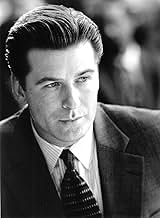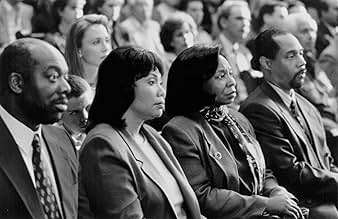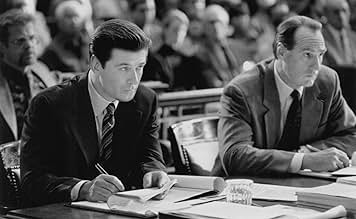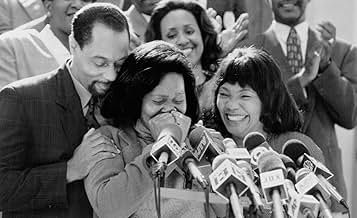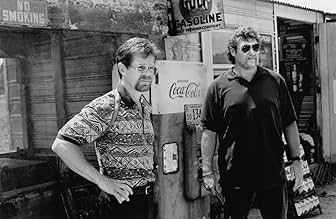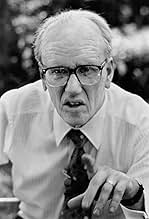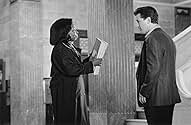NOTE IMDb
6,7/10
12 k
MA NOTE
Ajouter une intrigue dans votre langueA Mississippi district attorney and the widow of Medgar Evers struggle to finally bring a white supremacist to justice for the 1963 murder of the civil rights leader.A Mississippi district attorney and the widow of Medgar Evers struggle to finally bring a white supremacist to justice for the 1963 murder of the civil rights leader.A Mississippi district attorney and the widow of Medgar Evers struggle to finally bring a white supremacist to justice for the 1963 murder of the civil rights leader.
- Nommé pour 2 Oscars
- 2 victoires et 9 nominations au total
Joe Tello
- Drew DeLaughter
- (as Joseph Tello)
Alexa PenaVega
- Claire DeLaughter
- (as Alexa Vega)
Ben Bennett
- Benny Bennett
- (as Lloyd 'Benny' Bennett)
Avis à la une
Medgar Evers' tragic murder in Jackson, Mississippi, was overshadowed by the cold-blooded killing of three civil rights workers near Philadelphia, Mississippi, a year later. So too this film has been overshadowed by an earlier movie, "Mississippi Burning," about the Philadelphia homicides. I was even confused by the similar titles and accidentally rented "Ghosts of Mississippi," thinking it to be the earlier film. This is too bad because "Ghosts of Mississippi" is a winner all the way and Medgar Evers' assassination was as significant, if not more so, than the later dastardly acts of hate and malevolence.
Most of my generation remember one of Dylan's early recordings he wrote called "Pawn in the Game" about the Medgar Evers murder in which Dylan asserts that the coward who pulled the trigger and shot the civil rights leader in the back in front of his wife and three children was carrying out what the racist elements in Mississippi and in the nation as a whole had brainwashed the simple mind into executing. That the endemic racism in American was the real perpetrator of the heinous deed which deprived our society of one of its gifted leaders. "Ghosts of Mississippi" concentrates more on the scumbag who squeezed the trigger, played with élan by James Woods, almost a carbon copy of the killer in both speech, mannerisms, and looks.
James Woods is a member of a strong cast led by Whoopi Goldberg as the widow, Myrlie Evers, spending her life seeking a degree of justice for her husband and children. William H. Macy adds much needed humor in the role of Charlie Crisco, a member of the prosecution team. Unfortunately, his part is mainly limited to the middle section of the movie. Why director Rob Reiner and writer Lewis Colick decided to turn Macy's character into a cameo during the latter part of the film is unclear.
A subplot in the film is the growing involvement of prosecutor Bobby DeLaughter (Alec Baldwin) in the case, opening his eyes not only to the past evils of the society in which he lives but also hostile residue left by the civil rights movement in the state. Married to the daughter of one of Mississippi's most racist judges causes him to be blind to much of the injustice prevalent around him. Significantly, his wife is named Dixie (Virginia Madsen). The change that takes place in his character (which also involves a change in wives) as he is drawn deeper into the thirty-year-old case is pinpointed by his inability to continue to sing "Dixie" to his daughter to chase away the ghosts she sees at night. In explaining to her that the song might actually be encouraging the ghosts to reappear in her bedroom, the two opt for "Old McDonald" as a more suitable goodnight song.
Most of my generation remember one of Dylan's early recordings he wrote called "Pawn in the Game" about the Medgar Evers murder in which Dylan asserts that the coward who pulled the trigger and shot the civil rights leader in the back in front of his wife and three children was carrying out what the racist elements in Mississippi and in the nation as a whole had brainwashed the simple mind into executing. That the endemic racism in American was the real perpetrator of the heinous deed which deprived our society of one of its gifted leaders. "Ghosts of Mississippi" concentrates more on the scumbag who squeezed the trigger, played with élan by James Woods, almost a carbon copy of the killer in both speech, mannerisms, and looks.
James Woods is a member of a strong cast led by Whoopi Goldberg as the widow, Myrlie Evers, spending her life seeking a degree of justice for her husband and children. William H. Macy adds much needed humor in the role of Charlie Crisco, a member of the prosecution team. Unfortunately, his part is mainly limited to the middle section of the movie. Why director Rob Reiner and writer Lewis Colick decided to turn Macy's character into a cameo during the latter part of the film is unclear.
A subplot in the film is the growing involvement of prosecutor Bobby DeLaughter (Alec Baldwin) in the case, opening his eyes not only to the past evils of the society in which he lives but also hostile residue left by the civil rights movement in the state. Married to the daughter of one of Mississippi's most racist judges causes him to be blind to much of the injustice prevalent around him. Significantly, his wife is named Dixie (Virginia Madsen). The change that takes place in his character (which also involves a change in wives) as he is drawn deeper into the thirty-year-old case is pinpointed by his inability to continue to sing "Dixie" to his daughter to chase away the ghosts she sees at night. In explaining to her that the song might actually be encouraging the ghosts to reappear in her bedroom, the two opt for "Old McDonald" as a more suitable goodnight song.
Glossy but highly effective thriller based on the true story of an attempt to bring a racially motivated killer to trial. The film suffers from a certain liberal obviousness: brave, charming white man (who loves his kids) and dignified black widow fight side by side for justice; but it's always compelling, and pertinent too. No magic, then, but a strong story: one of director Rob Reiner's better efforts.
Ghosts of Mississippi is an emotional movie that shows how hateful the human soul can be. It may be quite similar to Mississippi Burning but they both have their place. Ghosts of Mississippi is slightly more political and less violent. It focuses on the fight for justice and the roadblocks faced in controversial high-profile cases.
The sheer effort that was involved to develop a level of tolerance in the South is despicable. Every time I watch a movie where racism is so prevalent it simultaneously boils my blood and breaks my heart. The acting is very good and makes you feel like you are living the story. James Woods does such a good job that you can't help but despise him. Especially since he is portraying a real person and not a two dimensional character.
Don't underestimate the emotional connection you will have to this movie. It will move you and is certainly worth your time.
The sheer effort that was involved to develop a level of tolerance in the South is despicable. Every time I watch a movie where racism is so prevalent it simultaneously boils my blood and breaks my heart. The acting is very good and makes you feel like you are living the story. James Woods does such a good job that you can't help but despise him. Especially since he is portraying a real person and not a two dimensional character.
Don't underestimate the emotional connection you will have to this movie. It will move you and is certainly worth your time.
I've seen this movie several times on the pay channels (the joys of modern television!). Overall the film is pretty good, and doesn't seem to take great license with history, which is refreshing. My only serious beef about this movie is the same as with Mississippi Burning and other films about the civil-rights struggle: Why do all of these movies insist on providing a white male central character, out to do good for the oppressed black people? Why not do this movie from the POV of Evers' widow, or brother? Because the (white male) power structure in Hollywood feels that audiences won't relate to stories without having a WASP in the middle of the action. This is not to minimize Bobby DeLaughter's role in bringing Byron de la Beckwith to justice; it's just to say that DeLaughter came along very late in the overall history of this case.
So, as to be expected, we're shown that DeLaughter braves ostracism, family conflict, and a death threat (probably a lot of them in real life). All very true, but we lose the fact that the Evers family went through all of this and more in 30 years of keeping the flame alive.
There are some good performances in here, especially James Woods, who had to be having a blast playing de la Beckwith, a mental midget and virulent racist in real life too. Baldwin is okay as DeLaughter but as bland as he normally is, even while affecting the Delta accent. Whoopi Goldberg is very good as the contemporary Myrlie Evers Williams, but ridiculous as the young widow in the flashback sequences. She's obviously too old, and it leaves you wondering if they were just too cheap to pay another actress or if Goldberg's ego is so large that she wouldn't allow it. The actor who played Evers' brother is so outstanding in such a small amount of screen time, you have to wonder why they didn't do more with him.
It's not a bad movie by any stretch, and it does give us a chance to see a little of what Medgar Evers was all about. I only wish that the film had been more about Medgar and Myrlie and much less about DeLaughter. As one other reviewer commented, this feels more like a made-for-TV movie than a theatrical release.
So, as to be expected, we're shown that DeLaughter braves ostracism, family conflict, and a death threat (probably a lot of them in real life). All very true, but we lose the fact that the Evers family went through all of this and more in 30 years of keeping the flame alive.
There are some good performances in here, especially James Woods, who had to be having a blast playing de la Beckwith, a mental midget and virulent racist in real life too. Baldwin is okay as DeLaughter but as bland as he normally is, even while affecting the Delta accent. Whoopi Goldberg is very good as the contemporary Myrlie Evers Williams, but ridiculous as the young widow in the flashback sequences. She's obviously too old, and it leaves you wondering if they were just too cheap to pay another actress or if Goldberg's ego is so large that she wouldn't allow it. The actor who played Evers' brother is so outstanding in such a small amount of screen time, you have to wonder why they didn't do more with him.
It's not a bad movie by any stretch, and it does give us a chance to see a little of what Medgar Evers was all about. I only wish that the film had been more about Medgar and Myrlie and much less about DeLaughter. As one other reviewer commented, this feels more like a made-for-TV movie than a theatrical release.
Based on fact and directed by Rob Reiner, Ghosts recounts the investigation, and retrial in 1994 - after two mistrials in the 60s - of Byron de la Beckwith for the racist shooting in 1963 of Medgar Evers, an NAACP activist. The film has gained renewed topicality with the recent conviction of another white supremacist for the Birmingham, Alabama, Baptist Church bombing, also in 1963.
Alec Baldwin gives a solid, and sometimes stolid, performance in the central role of prosecuting DA, Bobby DeLaughter (pronounced DeLaw), himself from Mississippi's white uppercrust, whose marriage hits the rocks because of his pursuit of the case. James Woods, convincingly made up to look over 70 for most of the movie, is electrifying as the arrogant, hateful Beckwith. Whoopi Goldberg portrays Medgar's widow with a lot of dignity and even a touch of humour, but it would have been understandable if she had also displayed a little more bitterness.
The movie is possibly not as powerful as Reiner hoped, partly no doubt because he was restricted by the facts. In particular, the retrial seems to have thrown up little or no new evidence, thus making the courtroom action less dramatic than in a fictional movie. Perhaps a greater criticism is that the intense focus on Baldwin/DeLaughter, who is in almost every scene, tends to turn him into the hero of the movie; whereas it should be Medgar Evers, who as a civil rights activist in one of the most bigoted areas of the USA deserves everyone's undying admiration.
Despite the movie's flaws, it is gripping for most of its 130 minutes, and this was certainly a story worth telling.
Alec Baldwin gives a solid, and sometimes stolid, performance in the central role of prosecuting DA, Bobby DeLaughter (pronounced DeLaw), himself from Mississippi's white uppercrust, whose marriage hits the rocks because of his pursuit of the case. James Woods, convincingly made up to look over 70 for most of the movie, is electrifying as the arrogant, hateful Beckwith. Whoopi Goldberg portrays Medgar's widow with a lot of dignity and even a touch of humour, but it would have been understandable if she had also displayed a little more bitterness.
The movie is possibly not as powerful as Reiner hoped, partly no doubt because he was restricted by the facts. In particular, the retrial seems to have thrown up little or no new evidence, thus making the courtroom action less dramatic than in a fictional movie. Perhaps a greater criticism is that the intense focus on Baldwin/DeLaughter, who is in almost every scene, tends to turn him into the hero of the movie; whereas it should be Medgar Evers, who as a civil rights activist in one of the most bigoted areas of the USA deserves everyone's undying admiration.
Despite the movie's flaws, it is gripping for most of its 130 minutes, and this was certainly a story worth telling.
Le saviez-vous
- AnecdotesYolanda King, the daughter of civil rights activist Martin Luther King, portrayed Medgar Evers' daughter Reena Evers in this film.
- GaffesWhen DeLaughter and his investigators drive up to a gas station, the prices for gas are all under a dollar. When DeLaughter is on the phone to Myrlie Evers standing on the other side of the signs, the prices are all now over a dollar.
- Citations
Myrlie Evers: [quoting Medgar Evers] When you hate, the only person who suffers is you, because most of the people you hate don't know it and the others don't care.
- Bandes originalesI Wish I Knew How It Would Feel to Be Free
Music by Billy Taylor
Lyrics by Billy Taylor and Dick Dallas
Performed by Dionne Farris
Courtesy of Columbia Records
By Arrangement with Sony Music Licensing
Meilleurs choix
Connectez-vous pour évaluer et suivre la liste de favoris afin de recevoir des recommandations personnalisées
- How long is Ghosts of Mississippi?Alimenté par Alexa
Détails
- Date de sortie
- Pays d’origine
- Langue
- Aussi connu sous le nom de
- Ghosts of Mississippi
- Lieux de tournage
- Sociétés de production
- Voir plus de crédits d'entreprise sur IMDbPro
Box-office
- Budget
- 36 000 000 $US (estimé)
- Montant brut aux États-Unis et au Canada
- 13 323 144 $US
- Week-end de sortie aux États-Unis et au Canada
- 168 012 $US
- 22 déc. 1996
- Montant brut mondial
- 13 323 144 $US
- Durée2 heures 10 minutes
- Couleur
- Mixage
- Rapport de forme
- 1.85 : 1
Contribuer à cette page
Suggérer une modification ou ajouter du contenu manquant

Lacune principale
By what name was Les fantômes du passé (1996) officially released in India in English?
Répondre

